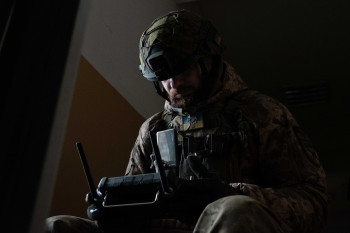Ukraine war latest: Russia launches fresh major assault on 'practically destroyed' Soledar near Bakhmut

Key developments on Jan. 9:
- General Staff: Russia trying to advance in Donetsk Oblast, conducts offensive in Bakhmut direction
- Russian attack on Shevchenkove village kills 2, injures 6 people
- 15 injured, including 2-year-old child, in attack on Ochakiv in southern Ukraine
- Iran 'may be contributing' to Russia's war crimes in Ukraine, says US
On Jan. 9, Russian forces renewed their attempt to capture the town of Soledar, which has long been a target of Russia's Bakhmut offensive in the eastern Donetsk Oblast, Deputy Defense Minister Hanna Maliar reported.
The last assault resulted in a "partial success" for the Moscow troops, however, the town remained under Ukrainian control "despite the continuing heavy bloody battles," according to the Ukrainian military.
Ukraine's Eastern Military Command spokesman Serhii Cherevatyi described Soledar as "practically destroyed" amid the fighting.
The salt-mining town is located just 10 kilometers northeast of Bakhmut, and is a crucial stronghold for Ukraine's defense efforts of the city, which is among Russia's most valuable targets.
Capturing Soledar and Bakhmut is important for Moscow to achieve its goal of occupying all eastern Donetsk Oblast in its administrative borders.
Ukraine expects the new assault on Soledar to be powerful as the Russian troops changed their tactics, as well as regrouped and transferred additional units to the area.
According to Maliar, Russian forces have also recovered losses by deploying a "large number of assault groups formed from Wagner Group's best reserves."
The Wagner Group, run by Yevgeny Prigozhin, a close confidant of Russian President Vladimir Putin, is a Russian state-controlled private paramilitary organization infamous for its brutal tactics. It has been linked to evidence of war crimes in conflicts around the globe.
President Volodymyr Zelensky earlier urged the world to recognize Wagner Group as a terrorist organization.
Iran accused of contributing to Russia's war crimes in Ukraine
U.S. National Security Adviser Jake Sullivan said on Jan. 9 that Iran may be "contributing to widespread war crimes" by selling lethal drones to Russia for use in its ongoing invasion of Ukraine.
"Iran had chosen to go down a road where their weapons are being used to kill civilians in Ukraine and to try to plunge cities into cold and darkness, which from our point of view, puts Iran in a place where it could potentially be contributing to widespread war crimes," Sullivan said.
U.S. President Joe Biden's administration has recently accelerated its efforts to stop Iran from providing drones to Russia. In the latest move, Washington announced new sanctions against Tehran's aviation and defense sectors on Jan. 6.
Russia has been attacking Ukraine with Iranian-made kamikaze drones, as well as missiles, since September, targeting civilians and destroying energy infrastructure across the country. The strikes resulted in rolling blackouts implemented in all Ukrainian oblasts and multiple civilian casualties.
Ukraine has shot down nearly 500 drones launched by Russia since then, according to Ukraine's Air Force.
Attacks and casualties
A morning attack on a local market in the village of Shevchenkove in the northeastern Kharkiv Oblast on Jan. 9 killed two women, aged 60 and 50, according to the region's governor Oleh Syniehubov. The official said the strike had also injured six people, including a child.
According to Syniehubov, Russian forces most likely used S-300 missile systems to attack the market.
In the afternoon of Jan. 9, Russian troops launched a missile strike on Ochakiv in the southern Mykolaiv Oblast, injuring 15 people, including a two-year-old child, the oblast governor Vitaliy Kim reported.
According to Kyrylo Tymoshenko, deputy head of the President's Office, the attack resulted in the damage to over 100 houses in the city.
On the same day, Tymoshenko reported that artillery shelling of the village of Kurakhivka in Donetsk Oblast wounded two people, as well as damaged private houses, farm buildings, and a car.
Russian forces also hit a residential area of Kherson city with artillery on Jan. 9, killing one person and injuring one, according to Kherson Oblast Governor Yaroslav Yanushevych.
The official reported that Russian troops had struck Kherson Oblast 77 times over the previous 24 hours with artillery, multiple launch rocket systems (MLRS), and mortars, wounding a total of three people.










